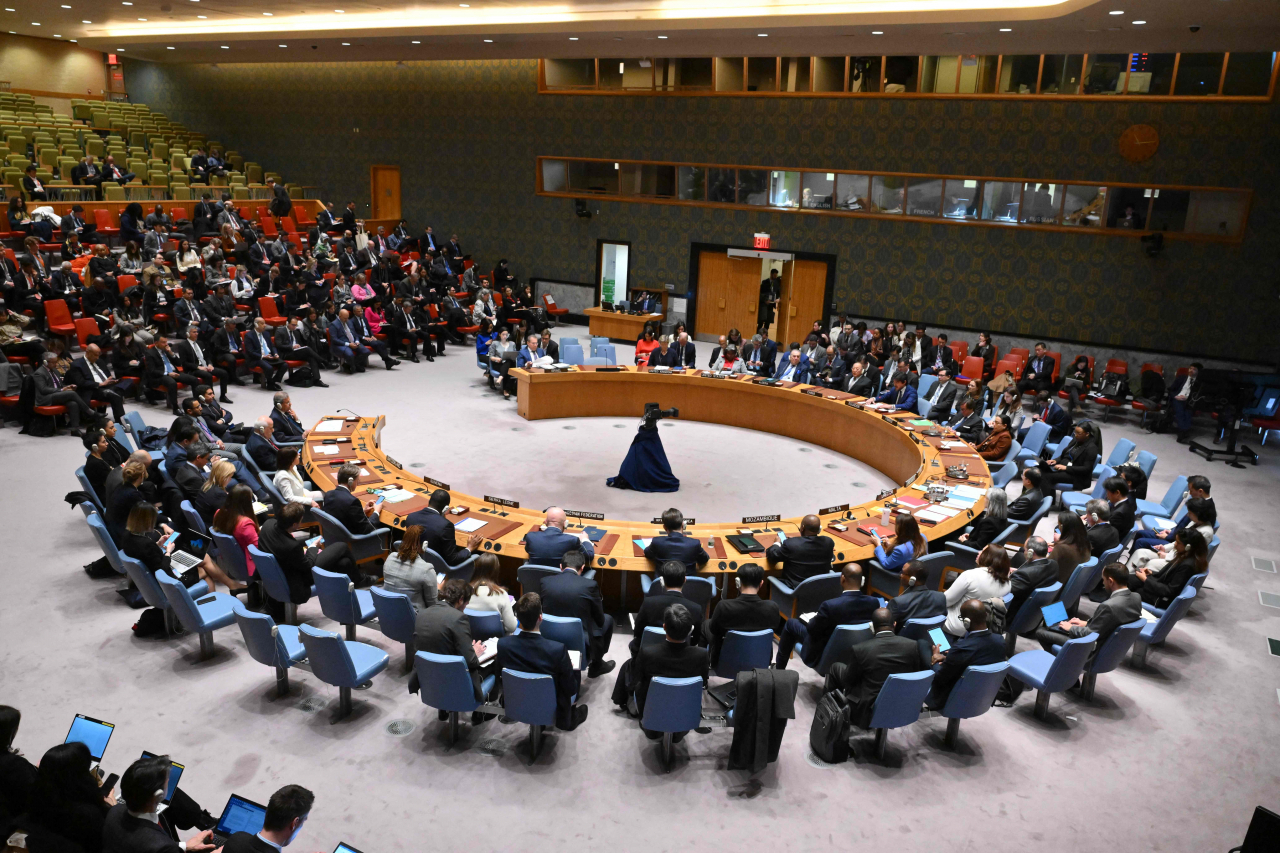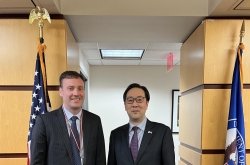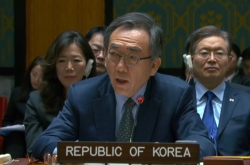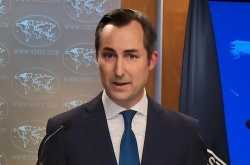 |
The United Nations Security Council meets at the UN headquarters in New York on Monday. (AFP-Yonhap) |
A divided UN Security Council failed Thursday to extend the mandate of the expert panel charged with monitoring the enforcement of sanctions against North Korea, in an unprecedented move likely to undermine global efforts to curb Pyongyang's nuclear and missile threats.
The council failed to adopt a new resolution meant to extend the mandate of the Panel of Experts by another year as Russia vetoed it amid its call for an annual extension of UNSC sanctions against Pyongyang. The panel's mandate is now set to expire on April 30.
In Thursday's vote of the 15-member council, 13 countries voted in favor of the resolution with China abstaining.
The failure to pass the resolution followed intense negotiations to reach a compromise among UNSC members with Russia said to have proposed a "sunset clause" for UNSC sanctions against the North -- a demand unacceptable to Seoul, Washington and other members.
The sunset clause, if adopted, would leave anti-Pyongyang sanctions in effect only for a certain period of time unless there was a UNSC agreement to keep them in place for another agreed-upon period.
The looming demise of the panel comes in the midst of deepening disunity in the UNSC with Russia seeking closer ties with China and North Korea amid its ongoing war in Ukraine, and the United States, its allies and partners tightening their solidarity.
The panel's mandate had been extended annually since it was launched in 2009 in line with UNSC Resolution 1874 adopted in response to the North's second nuclear test in May of the same year.
Assisting the UNSC Sanctions Committee on North Korea, the panel has served as a key institutional platform to oversee sanctions on the North. It has published two reports each year -- an interim report and a final report -- on instances of sanctions violations based on information from UN member states and other open-source materials.
South Korean Ambassador to the UN Hwang Joon-kook lambasted Russia's exercise of the veto power, stressing that there can be "no justification for disbanding the guardians" of the UN sanctions regime on the North.
"This is almost comparable to destroying a CCTV to avoid being caught red-handed," he said.
"Today, we witnessed yet another setback in the authority of this august body, as well as in the international non-proliferation regime. A permanent member of the Security Council and depository of the non-proliferation treaty completely abandoned its responsibility," he added.
Hwang also criticized Moscow's "blind self-centeredness" while noting that Russia appears to be "more interested in embracing or encouraging the North" for its provision of munitions and ballistic missiles for the conduct of its war in Ukraine at the expense of nuclear nonproliferation regime.
"As Russia puts its blind self-centeredness over the council's collective responsibility for the maintenance of international peace and security, the DPRK Panel of Experts, one of the council's most vibrant and significant subsidiary organs, has been forced to cease its work," he said.
DPRK stands for the North's official name, the Democratic People's Republic of Korea.
White House National Security Communications Advisor John Kirby also criticized Russia's exercise of the veto.
"Russia today vetoed the UNSC's routine renewal of a UN panel that monitors sanctions on the DPRK," he said in an online briefing.
"The reckless action today further undermines critical sanctions that the United States of the UNSC has imposed in response to North Korea's multiple nuclear tests and ballistic missile launches," he added.
In a separate statement, the South Korean government expressed "deep regrets" over the failure to adopt the resolution due to Russia's veto.
"The Panel of Experts has carried out its role in monitoring the DPRK, which ... has continued to violate sanctions through various illicit activities such as nuclear and missile provocations, weapons exports, dispatch of workers overseas, cyber heists, and military cooperation with the Russian Federation and advanced its nuclear and missile capabilities," Seoul's foreign ministry said.
The ministry also emphasized that Russia has made an "irresponsible decision of going against the will of the other members, thereby significantly undermining the UN sanctions regime and the credibility of the council."
Before the vote, Russian Ambassador to the UN Vasily Nebenzya argued that UNSC sanctions on the North have not been able to achieve their stated aims, and have not led to improvement in the security situation on the Korean Peninsula while imposing a "heavy burden" on North Koreans.
"Russia has called for the council to adopt a decision to hold an open and honest review of the council sanctions measures in respect of the DPRK, moving the restrictions onto an annual basis that would allow us to organize a genuinely engaged discussion of the problems," he said.
"If an agreement is reached for an annual extension of the sanctions, the mandate of the Panel of Experts would then make sense," he added.
He went on to say, "In these circumstances, we don't see any added value in the work of the Panel of Experts."
Soon after the UNSC vote, Robert Wood, the deputy US ambassador to the UN, underscored that "Russia owns this failure."
"Russia is the reason you will no longer receive reports from the Panel of Experts," he said.
"Today's vote will only embolden the DPRK to act with further impunity as the DPRK jeopardizes global security through the development of long-range ballistic missiles and sanctions evasion efforts."
Later, Matthew Miller, a State Department spokesperson, expressed disappointment over Russia's veto of the resolution and China's abstention, while casting the panel as the "gold standard for providing fact-based independent analysis and recommendations" on sanctions enforcement.
"Russia's actions today have cynically undermined international peace and security, all to advance the corrupt bargain that Moscow has struck with the DPRK," he told a press briefing.
"Moscow appears to be intent on facilitating the DPRK's illegal pursuit of weapons of mass destruction and its veto today was a self-interested effort to bury the panel's reporting on its own collusion with the DPRK to secure weapons that it can use to further its aggression against Ukraine," he added.
Miller also called Russia's veto an "example of greater DPRK-Russia cooperation."
The panel consists of eight experts from the permanent UNSC members -- the US, Britain, France, China and Russia -- as well as South Korea, Japan and Singapore.
Since its inception, the panel has laid bare a series of sanctions violations, including those about the North's nuclear and missile programs and other prohibited activities, such as the import of luxury goods and ship-to-ship transfers of sanctioned items. (Yonhap)










![[Today’s K-pop] Blackpink’s Jennie, Lisa invited to Coachella as solo acts](http://res.heraldm.com/phpwas/restmb_idxmake.php?idx=644&simg=/content/image/2024/11/21/20241121050099_0.jpg)